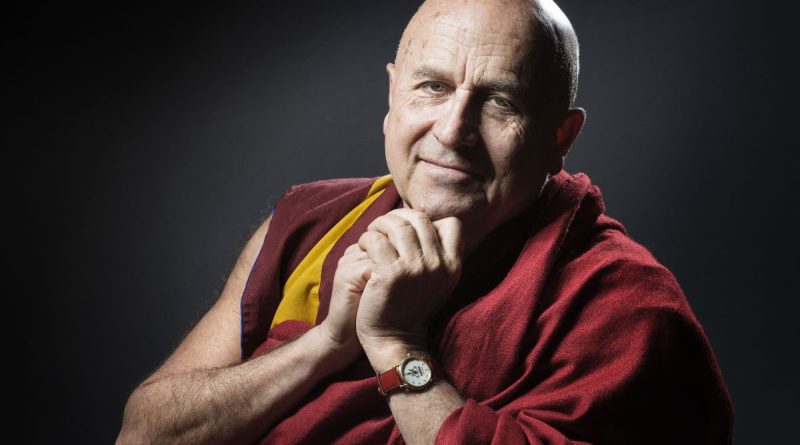The secret to happiness of Matthieu Ricard, “the happiest man in the world” | The State
Scientists at the University of Wisconsin have been studying the brain of the Matthieu ricard, a doctor of molecular biology, a Buddhist monk at the Shechen Tennyi Dargyeling Monastery in Nepal and a personal advisor to the Dalai Lama, as well as his translator. And they are absolutely fascinated with the mind of this 74-year-old Frenchman.
The researchers subjected Ricard’s brain to constant nuclear MRIs lasting up to three hours.
They connected up to 256 sensors to his head to detect his level of stress, irritability, anger, pleasure, satisfaction and dozens of other different sensations. And they did the same with hundreds of volunteers.
The results obtained measured the level of happiness of each participant on a scale that ranged from 0.3 (very unhappy) to -0.3 (very happy).
Matthieu ricard it achieved no less than -0.45, exceeding not only all the other participants but the limits set in the study.
From there, he was declared “the happiest man in the world.”
Ricard – son of the well-known French philosopher Jean-François Revel and the painter Yahne Le Toumelin– He has written a delicious book with his friends the philosopher Alexandre Jollien and the psychiatrist Christophe André that has been a best seller in France and now comes out in Spanish under the title “Long Live Liberty!” (Editorial Arpa).
A book in which the three authors explain how to overcome the fears, traumas, prejudices and addictions that haunt us. In short: how to overcome the obstacles that prevent us from being happy.
We talked to Ricard about all that and more.
Was declared “the happiest man in the world”. How do you feel about that title?
Think for five seconds: how can anyone know the level of happiness of 7 billion human beings? It doesn’t make sense, certainly not from a scientific point of view.
It all started with an article in a British newspaper that, based on research conducted in Richard Davidson’s neuroscience laboratory in Wisconsin, showed that people who like me have been meditating for a long time (there were 15 of those who participated in the study) showed by meditating an activation magnitude in certain areas of the brain on compassion (not happiness!) higher than has ever been detected before in neuroscience.
So it’s more like the “world’s biggest joke,” but it keeps coming back over and over again.

What is happiness to you?
Happiness is not simply an endless succession of pleasant sensations, which seems more like a recipe for exhaustion.
Rather, it is an optimal way of being that results from the cultivation of many fundamental qualities such as altruism, compassion, inner freedom, resilience, emotional balance, inner balance, inner peace, and others.
Unlike pleasure, all of these qualities are abilities that can be cultivated through practice and training of our mind.
Do you consider yourself a happy man?
Well, even if I am not the “happiest person in the world”, for the reasons I just explained, I cannot say that I am unhappy either.
I have had a wonderful life, thanks to meeting wise men and women, my spiritual teachers.
I am also fine because I am easily satisfied with very little. I donated all the proceeds from my books and photographs to humanitarian causes.
20 years ago I founded a humanitarian organization, Karuna-Shechen, which now helps more than 300,000 people every year in the field of health, education and social services, mainly in India, Nepal and Tibet, but soon also in France . And that is a great reason for satisfaction.
Thanks to my spiritual practice, I personally enjoy every moment of life and try to be of service to others.
And what is the secret of happiness?
Altruism and compassion.
The selfish pursuit of happiness does not work, it is a lose-lose situation. You make your own life miserable while making everyone else’s life miserable.
Rather, altruism is a win-win situation.
The goal is to bring happiness to others and remedy their suffering, and as a bonus, one feels great happiness by being kind and benevolent.
You are celibate, you have not had sex since you were 30, and you have no money, everything you earn is donated to works ofcharity. Sex and money are the two most prominent signs of modern culture. What’s wrong with them?
There is nothing wrong. It is not desire as such and wealth that cause suffering, but our attachment to them.
The moment clinging, clinging, and obsession set in, you can be sure that torment will come.
Holding on is the problem, we get addicted to them.

Now a question for the biologist: is sadness something that we create in our brain or is it society that makes us unhappy?
Well, several studies have shown that a distracted mind is not a happy mind, that a ruminating mind is not a happy mind, and that exacerbated sense of self-importance does not lead to happiness either.
Is it possible to be happy in today’s world without being a Buddhist monk?
Of course! It would be a shame if happiness were limited to Buddhists and even more so to being a monk!
Anyone can be the happiest woman or man in the world (not in a competitive way!) Simply by being kind, compassionate, open to others, and easily satisfied with external conditions.
Have you always been a happy person or did it take you a long way to be?
Friends who knew me when I was a teenager (there are still some alive) say I was a grumpy young man.
So I guess I made a little progress, although I still have a long way to go.
Is happiness a genetic gift, something you are born with, or is it something you can learn?
We all have various natural tendencies, related to our genetic heritage. But that can be changed in a big way.
We know through epigenetic studies that genes may or may not be expressed, depending on external conditions.
We also know through brain studies that we can change through training, thanks to brain neuroplasticity.
And we know through contemplative traditions that if we practice for a long time the basic human qualities that I mentioned, altruism above all, we can definitely change for the future.

Does he get sad “happiest man in the world“?
Of course, it is absolutely normal and desirable to be sad in the face of a massacre, injustice, discrimination, abuse, social injustice, poverty in the midst of abundance, the blind exploitation of animals, etc.
But this sadness should lead to compassionate action to do something about the various related sufferings.
Sadness is not despair, it is compatible with genuine flourishing.
In his latest book, “Viva la lfreedom ”, reflects on how to achieve inner freedom. What is inner freedom?
Inner freedom is being free from mental traits, musings and mental projections that eventually translate into frustration and suffering.

If we do not achieve inner freedom, does it mean that we are slaves? Slaves to what?
“Slave” is perhaps an important word, but when we are completely dominated by hatred, compulsive desire, persistent jealousy, and arrogant pride, we are somehow slaves to our own mental fabrications.
In that case, our mind is far from free and blindly follows its attractions and repulsions, attributing to them a kind of solid existence: we believe that something is inherently desirable or someone inherently detestable, which it never is.
Can everyone achieve inner freedom?
Why not? After all, this is our own mind.
Our control of external conditions is limited, ephemeral, and often illusory, but we can work with our own mind as we deal with it from morning to night.
Our mind can be our best friend or our worst enemy; it is the mind that translates external circumstances into happiness or misery.
So if we can train this spoiled child that is the mind a little and control it a bit, it will go a long way to free ourselves from our habitual tendencies and automatic thoughts and thus be happier.

What is the biggest obstacle to achieving inner freedom?
There are many obstacles, including being addicted to suffering, blindly following all of our afflictive states of mind, and failing to recognize the potential for transformation within all of us.
But the main obstacle is mental confusion, lack of discernment and wisdom.
If you could only give one piece of advice to achieve inner freedom, what would it be?
There is no single tip. It takes time and perseverance, but it is the most inspiring adventure in life.
One thing is for sure: we must get rid of selfishness and cultivate kindness, benevolence, and compassion.
Is our brain designed to achieve inner freedom? And if so, Why is it so difficult to get it?
Our brain is not designed one way or another.
Thanks to the plasticity of the brain, it becomes what we get used to: if we get angry all the time, the corresponding networks will be reinforced in the mind.
If we cultivate altruism and emotional balance, the corresponding brain network will be strengthened.
All neuroscientific studies have shown that cultivating attention, compassion, and freeing ourselves from obsessive thoughts produces both functional and structural changes in the brain.
Monsieur Ricard, you are a molecular biologist and a Buddhist monk. What have you learned from biology and Buddhism to achieve inner freedom?
Great topic indeed.
Science taught me a taste for a rigorous approach to reality, the opposite of blind belief.
Science freed me from believing in all kinds of crazy things, as it happens more and more these days.
As for Buddhism, it gives me the keys to an inner freedom that can be achieved through a lifetime of practice.
Remember that you can receive notifications from BBC News Mundo. Download the latest version of our app and activate them so you don’t miss out on our best content.
.



